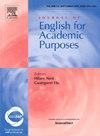Profiling the outcomes of academic discourse socialisation through academic writing: A Q methodology study on student writers’ self-reflections
IF 3.4
1区 文学
Q1 EDUCATION & EDUCATIONAL RESEARCH
引用次数: 0
Abstract
Academic writing can be viewed as academic discourse socialisation (ADS), wherein learners engage with contextual affordances to adapt their writing, thinking and acting patterns. While the discoursal aspect of ADS outcomes is typically reflected in students' written products, the cognitive and behavioural aspects have yet to be effectively evaluated, despite individual-level evidence from case studies. To holistically explore students' changing writing- and learning-related beliefs and practices as their ADS outcomes, we introduced Q methodology to elicit cohort-level reflections. The same 60-statement Q sorting task was administered twice during an academic English writing course at a Chinese EFL university to 30 undergraduates from one class, followed by Q-based interviews with representative cases. By comparing the students' profiles yielded across two rounds, we identified three primary facets of their ADS outcomes, including advancing formal and rhetorical understanding of academic writing, enhancing awareness of academic source use, and effective use of socialising learning resources. Nevertheless, within a confined EFL learning and writing context, they consistently showed little sense of integration either into tertiary academic culture or into broader academic communities. Round 2 profiles' divergences further implied the variations in ADS outcomes stemming from individuals’ differing perceptions and interactions with contextual affordances.
通过学术写作分析学术话语社会化的结果:学生作家自我反思的Q方法论研究
学术写作可以被看作是学术话语社会化(ADS),学习者利用语境支持来适应他们的写作、思维和行为模式。虽然ADS结果的话语方面通常反映在学生的书面产品中,但认知和行为方面尚未得到有效评估,尽管有来自案例研究的个人层面的证据。为了全面探索学生的写作和学习相关的信念和实践的变化作为他们的ADS结果,我们引入了Q方法来引出队列水平的反思。在一所中国英语大学的学术英语写作课程中,对来自一个班级的30名本科生进行了两次相同的60句Q排序任务,随后进行了代表性案例的Q访谈。通过比较两轮学生的个人资料,我们确定了他们ADS成果的三个主要方面,包括提高对学术写作的正式和修辞理解,提高对学术资源使用的认识,以及有效利用社交学习资源。然而,在有限的英语学习和写作环境中,他们始终表现出很少融入高等教育学术文化或更广泛的学术社区的意识。第2轮资料的差异进一步暗示了ADS结果的差异源于个体不同的感知和与上下文启示的相互作用。
本文章由计算机程序翻译,如有差异,请以英文原文为准。
求助全文
约1分钟内获得全文
求助全文
来源期刊

Journal of English for Academic Purposes
Multiple-
CiteScore
6.60
自引率
13.30%
发文量
81
审稿时长
57 days
期刊介绍:
The Journal of English for Academic Purposes provides a forum for the dissemination of information and views which enables practitioners of and researchers in EAP to keep current with developments in their field and to contribute to its continued updating. JEAP publishes articles, book reviews, conference reports, and academic exchanges in the linguistic, sociolinguistic and psycholinguistic description of English as it occurs in the contexts of academic study and scholarly exchange itself.
 求助内容:
求助内容: 应助结果提醒方式:
应助结果提醒方式:


